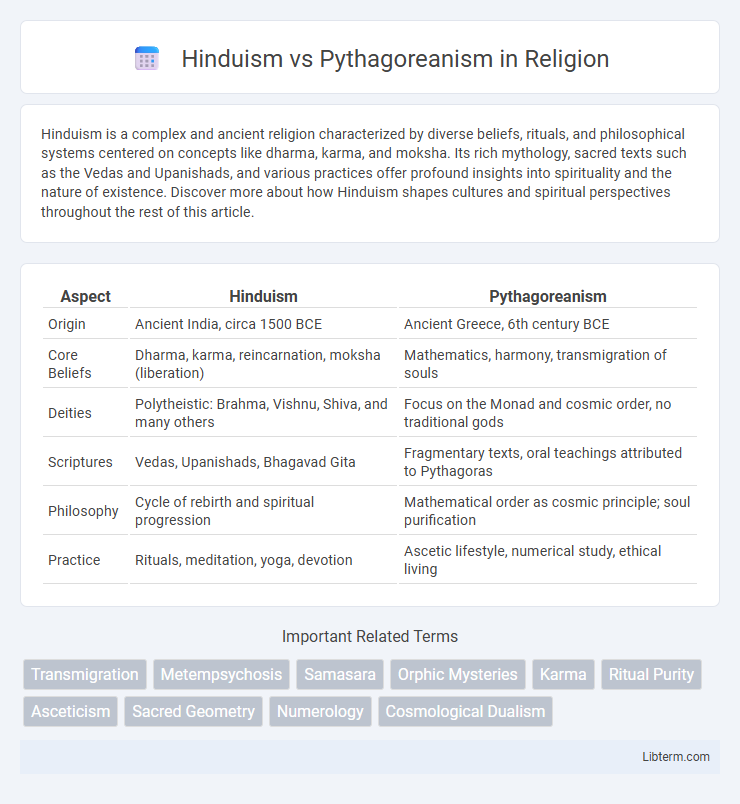Hinduism is a complex and ancient religion characterized by diverse beliefs, rituals, and philosophical systems centered on concepts like dharma, karma, and moksha. Its rich mythology, sacred texts such as the Vedas and Upanishads, and various practices offer profound insights into spirituality and the nature of existence. Discover more about how Hinduism shapes cultures and spiritual perspectives throughout the rest of this article.
Table of Comparison
| Aspect | Hinduism | Pythagoreanism |
|---|---|---|
| Origin | Ancient India, circa 1500 BCE | Ancient Greece, 6th century BCE |
| Core Beliefs | Dharma, karma, reincarnation, moksha (liberation) | Mathematics, harmony, transmigration of souls |
| Deities | Polytheistic: Brahma, Vishnu, Shiva, and many others | Focus on the Monad and cosmic order, no traditional gods |
| Scriptures | Vedas, Upanishads, Bhagavad Gita | Fragmentary texts, oral teachings attributed to Pythagoras |
| Philosophy | Cycle of rebirth and spiritual progression | Mathematical order as cosmic principle; soul purification |
| Practice | Rituals, meditation, yoga, devotion | Ascetic lifestyle, numerical study, ethical living |
Origins and Historical Background
Hinduism, one of the world's oldest religions, originated over 4,000 years ago in the Indus Valley civilization of ancient India, deeply rooted in Vedic traditions and texts such as the Rigveda. Pythagoreanism emerged in the 6th century BCE in ancient Greece, founded by the mathematician and philosopher Pythagoras, emphasizing numerical relationships and metaphysical principles. Both systems reflect distinct cultural evolutions: Hinduism integrates diverse rituals, philosophies, and mythologies, while Pythagoreanism centers on mathematical harmony and the soul's immortality within a philosophical framework.
Core Philosophical Concepts
Hinduism centers on concepts like Dharma (duty/ethics), Karma (action and consequence), Samsara (cycle of rebirth), and Moksha (liberation from Samsara), emphasizing spiritual growth and unity with Brahman, the ultimate reality. Pythagoreanism revolves around the belief in the metaphysical significance of numbers, harmony in the cosmos, and the immortality of the soul, asserting that reality can be understood through mathematical relationships and the pursuit of moral purity. Both systems integrate ethics, metaphysics, and an ultimate aim of transcending the physical world, but Hinduism focuses on spiritual liberation through cyclical existence, while Pythagoreanism highlights cosmic order via numerical principles.
Cosmology and Worldview
Hindu cosmology envisions an infinite, cyclical universe governed by the eternal principles of Dharma and Karma, where time is divided into vast Yugas representing cosmic ages and the universe undergoes continuous cycles of creation, preservation, and destruction by deities like Brahma, Vishnu, and Shiva. Pythagorean cosmology, rooted in mathematical harmony and numerical relationships, views the cosmos as an ordered, finite system structured by the "music of the spheres," where celestial bodies produce harmonious sounds based on their distances and movements, reflecting a rational and abstract worldview. Both systems emphasize a structured universe, but Hinduism integrates spiritual cycles and divine agency, while Pythagoreanism prioritizes numerical order and metaphysical harmony.
The Nature of the Divine
Hinduism perceives the divine as an all-encompassing Brahman, an infinite, formless reality that manifests in diverse deities representing various aspects of existence. Pythagoreanism views the divine through the lens of mathematical harmony and order, emphasizing numbers and geometric principles as expressions of a cosmic intelligence. Both systems recognize a foundational unity, yet Hinduism centers on spiritual realization and cosmic illusion, while Pythagoreanism stresses abstract rationality and numerical relationships.
Concepts of the Soul
Hinduism conceptualizes the soul as Atman, an eternal, immutable essence that undergoes cycles of rebirth and strives for Moksha, or liberation from samsara, through self-realization and unity with Brahman. Pythagoreanism views the soul as a divine and immortal entity that inhabits the body temporarily and aims for purification and harmony through philosophical study and ethical living. Both traditions emphasize the soul's immortality and the pursuit of spiritual purification, yet Hinduism integrates a complex metaphysical framework of karma and reincarnation while Pythagoreanism focuses on mathematical harmony and moral virtue.
Rituals and Practices
Hinduism emphasizes daily rituals such as puja, yajna, and meditation, incorporating offerings, chanting of mantras, and adherence to dharma for spiritual growth and cosmic harmony. Pythagoreanism centers on rituals involving number symbolism, music, and communal purification rites aimed at achieving spiritual purification and alignment with mathematical order. Both systems use ritualistic practices to attain higher knowledge, but Hinduism integrates a broad spectrum of symbolic worship, whereas Pythagoreanism focuses on mathematical and mystical discipline.
Ethical Principles and Values
Hinduism emphasizes dharma, karma, and ahimsa as core ethical principles, promoting duty, non-violence, and spiritual growth. Pythagoreanism centers on harmony, justice, and the pursuit of purity through mathematics and philosophy. Both systems advocate moral conduct and balance, but Hinduism integrates spiritual liberation, while Pythagoreanism focuses on rational order and cosmic harmony.
Mathematics, Mysticism, and Sacred Numbers
Hinduism intricately intertwines mathematics with mysticism through concepts like zero, infinity, and sacred geometries symbolized in yantras and the Sri Yantra, reflecting cosmic order and spiritual principles. Pythagoreanism emphasizes the mystical significance of numbers, where integers and ratios form the foundation of reality and harmony, exemplified by the Pythagorean theorem and the importance of the tetractys. Both systems view numbers as divine symbols, connecting mathematical truths to spiritual insights and universal laws.
Views on Reincarnation and Afterlife
Hinduism teaches the cyclical concept of reincarnation (samsara), where the soul (atman) undergoes continuous birth, death, and rebirth until achieving liberation (moksha) through karma and dharma adherence. Pythagoreanism, rooted in ancient Greek philosophy, similarly embraces the transmigration of souls (metempsychosis), positing the soul's immortality and movement through various bodies as a form of spiritual purification. Both traditions emphasize ethical living's role in influencing the soul's journey and ultimate spiritual state after death.
Influence on Later Religions and Philosophies
Hinduism's concepts of karma, dharma, and reincarnation profoundly shaped later Eastern religions such as Buddhism and Jainism, influencing ethical frameworks and spiritual practices across Asia. Pythagoreanism contributed significantly to Western philosophical traditions, introducing ideas about metaphysical realities, numerical harmony, and the immortality of the soul that impacted Plato and Neoplatonism. Both systems fostered foundational metaphysical and ethical principles that permeated diverse religious and philosophical developments throughout history.
Hinduism Infographic

 libterm.com
libterm.com